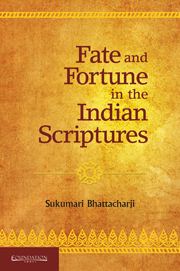
- Publisher:
- Foundation Books
- Online publication date:
- October 2014
- Print publication year:
- 2014
- Online ISBN:
- 9789384463052
- Subjects:
- Philosophy of Religion, Religion

Fatalism is a philosophical doctrine which states that an individual does not have full control over the events that happen in his life. There is no trace of fatalism in the early Indian literature - Samhitas, Brahmanas and Upanisads; it surged in the succeeding period. This book argues that the predominance of the priestly class after the revival of Brahminism, as an aftermath of the decline of Buddhism, ushered in conspicuous changes in people's attitude to life. The new modifications helped to entrench fate as a formidable force. It explains that the natural factors which led to the rise of fatalism were observation of the inexorability of death. The author has referred to a splendid array of scriptures ranging from the early and late Vedic literature, Ramayana, Mahabharata to Buddhist and Jain texts, Bible and other old western texts to establish her erudite findings.
"This is not only a major study of the presence - and absence - of a basic philosophical attitude in Indian classical literature and history by one of the leading scholars of ancient India, but also a significant contribution to the difficult philosophical understanding of the exact content of fatalism itself - an understanding that is too often missed. A great book!"
Amartya Sen
 Loading metrics...
Loading metrics...
* Views captured on Cambridge Core between #date#. This data will be updated every 24 hours.
Usage data cannot currently be displayed.